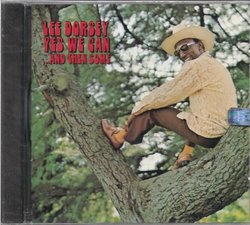| All Artists: Lee Dorsey Title: Yes We Can Members Wishing: 3 Total Copies: 0 Label: Polygram Records Original Release Date: 1/1/1970 Re-Release Date: 2/23/1993 Genres: Pop, R&B Style: Soul Number of Discs: 1 SwapaCD Credits: 1 UPCs: 731451786525, 731451786549, 031451786526 |
Search - Lee Dorsey :: Yes We Can
 | Lee Dorsey Yes We Can Genres: Pop, R&B |
Larger Image |
CD Details |
CD ReviewsLee Dorsey: A New Orleans Classic J P Ryan | Waltham, Massachusetts United States | 07/22/2007 (5 out of 5 stars) "With a voice like a wonderfully wry, warm, generous smile, Lee Dorsey's music remains as knowing, sly, open-hearted, and idiosyncratic as one could hope given that he was one of New Orleans' most successful national hitmakers. Certainly the laid back rhythm of the city is evident in a vocal persona that betrayed fewer gospel mannerisms than any other 'soul' singer of his generation (Dorsey was born December 24, 1926). Indeed, Lee was joyous and wary, restrained and intimate. You almost felt like this most conversational of stylists was singing to you straight from his body-and-fender shop. Debuting in 1957 on Ace ('Rock'), Dorsey's early singles gained attention on his home turf, but it wasn't until he Bobby Robinson signed Dorsey to his Fury label in 1961 that he hit big nationally, with the surreal 'Ya Ya' and 'Do-Re-Me'. 1963 saw Lee recording with the A.F.O. All Stars for Smash, and Constellation released a pair of singles the following year. These coincided with Allen Toussaint's two years' military service.
By the time "Yes We Can" was released by Polydor in 1970, Dorsey and Toussaint had been collaborating for so long that a classic album was almost inevitable. Toussaint first worked with Dorsey as pianist on the singer's 1958 single 'Lottie Mo' (Valiant Records). During the especially prolific 1965 - 70 period the pair scored several national hits ('Working In The Coal Mine', 'Ride Your Pony', 'Holy Cow', etc) on the Amy label. All of the Amy material has been collected on two terrific CDs issued by Sundazed, "Ride Your Pony" and "The New Lee Dorsey". Both titles were originally Amy LPs, and in 2000 they were greatly expanded for a combined total of 47 tracks, nearly every one a gem. Toussaint always used the very best New Orleans musicians available (and his own piano playing is always a pleasure), and by 1967 or '68 that included The Meters, whose infectious, syncopated rhythms are evident throughout the later Amy material, and throughout "Yes We Can", the most mature and unified Dorsey album. Sadly, "Yes We Can" was not a hit in 1970, though over the next few years several of its songs did climb the charts when covered by the likes of Ringo Starr, Robert Palmer, and The Pointer Sisters. Thus, there was no follow-up album, though Polydor did issue a few more singles into 1973. As of this writing, the only version of "Yes We Can" in print is the Australian Raven label's 2005 transfer. Raven adds two of those non-album singles (1972's 'When Can I Come Home' and 1973's masterpiece 'On Your Way Down') along with Dorsey's next, and last album, "Night People" (1978, originally on ABC). The set is, obviously, essential, but if you've heard Polygram Chronicles'1993 CD edition you know it's also somewhat disappointing, for the Polygram set collects seven terrific outtakes and non-album singles, and throws in two superb 1963 sides recorded for Smash, so if you only have the Raven edition you're missing such gems as Dorsey's take on Ray Charles' 'Lonely Avenue' and the deeply funky single 'If She Won't (Find Someone Who Will)'. This is one album that demands the expanded edition treatment, and in its country of origin. Just play 'Occapella,' 'Riverboat', or 'On Your Way Down' and I bet you will agree it is truly one of the greatest soul/funk albums to emerge from New Orleans - ever. Now let's get this one back in print!" |
